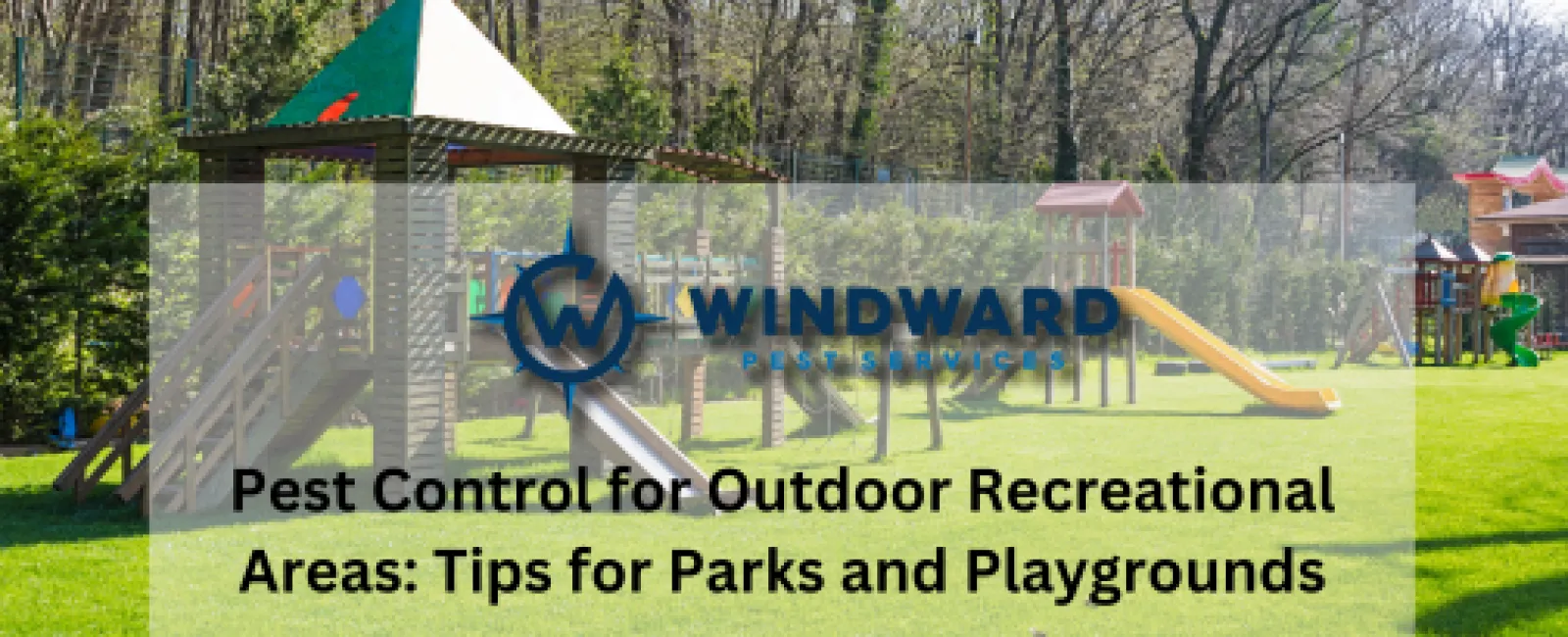Outdoor recreational areas like parks and playgrounds offer much-needed spaces for relaxation, exercise, and social interaction. However, these open environments can also attract unwanted pests that threaten the safety and enjoyment of visitors. Mosquitoes, ants, wasps, rodents, and other pests can disrupt activities, cause damage, and even pose health risks. Managing pests in such spaces requires a balanced approach that ensures safety while preserving the natural ecosystem.
For property managers, municipalities, and homeowners' associations overseeing outdoor spaces in Atlanta, pest control is a crucial component of maintenance. Windward Pest Services offers comprehensive pest control solutions, including Atlanta pest control, Atlanta interior and exterior pest treatments, and regular pest inspections. These services provide tailored solutions for parks, playgrounds, and other communal spaces. In this article, we'll explore effective pest management strategies and the importance of professional pest control for outdoor recreational areas.
Why Pest Control Matters in Outdoor Recreational Areas
Pests in parks and playgrounds are more than just a nuisance. They can cause direct harm to visitors, spread diseases, and damage infrastructure. For example:
Health Risks: Mosquitoes are notorious for transmitting diseases like West Nile virus, Zika virus, and dengue fever. Rodents can carry leptospirosis and hantavirus, while ants and wasps can cause allergic reactions through their stings.
Damage to Facilities: Termites and rodents can weaken wooden playground structures, benches, and fencing. They may also damage electrical wiring in park lighting or irrigation systems.
Disruption of Activities: Ant infestations in sandpits, wasps near picnic areas, or mosquitoes at outdoor events can discourage visitors from enjoying these spaces.
Effective pest control helps ensure that parks and playgrounds remain safe, welcoming environments for everyone.
Key Pest Threats in Outdoor Recreational Areas
Understanding the common pests in parks and playgrounds can inform better prevention and management practices.
1. Mosquitoes
- Thrive in standing water such as puddles, fountains, or poorly drained areas.
- Pose significant health risks due to their ability to transmit diseases.
- Require targeted mosquito services to reduce populations effectively.
2. Ants
- Can infest picnic areas, trash bins, and sandpits.
- Fire ants, in particular, are a threat due to their painful stings.
3. Wasps and Bees
- Often nest in sheltered areas, such as under playground equipment or in nearby trees.
- Can become aggressive if disturbed, posing a risk to visitors.
4. Rodents
- Seek food and shelter in trash bins, storage sheds, and vegetation.
- Pose health risks and can damage park facilities.
5. Termites
- Target wooden structures, such as play equipment, benches, and pergolas.
- Require termite coverage to prevent costly damage.
Tips for Managing Pests in Parks and Playgrounds
1. Implement Routine Inspections
Regular inspections are critical for identifying early signs of pest activity. Windward Pest Services pest inspections can pinpoint problem areas and recommend targeted treatments. Inspections should focus on:
- Trash collection areas
- Water features and drainage systems
- Vegetation and landscaping
- Wooden structures
2. Eliminate Breeding Grounds
Pests thrive in environments that provide food, water, and shelter. Prevent infestations by addressing these factors:
- Remove standing water from fountains, gutters, and puddles.
- Keep trash bins tightly sealed and emptied regularly.
- Prune overgrown vegetation to eliminate hiding spots for pests.
3. Apply Integrated Pest Management (IPM) Practices
Integrated Pest Management (IPM) combines multiple strategies to control pests while minimizing environmental impact. Key IPM practices for parks and playgrounds include:
- Using physical barriers like netting or fencing to deter pests.
- Applying eco-friendly pest control treatments that target specific pests without harming beneficial insects.
- Educating visitors about proper waste disposal and other pest-prevention measures.
4. Schedule Regular Pest Control Services
Partnering with a professional pest control provider ensures consistent, effective management. Windward Pest Services offers quarterly services to maintain a pest-free environment throughout the year. These treatments can include:
- Mosquito services to reduce populations near water features and shaded areas.
- Termite coverage to protect wooden structures.
- Comprehensive Atlanta interior and exterior pest treatments tailored to outdoor spaces.
5. Maintain Play Equipment and Facilities
Inspect and repair playground equipment, benches, and fencing to prevent pest infestations. Use treated wood or metal materials that are less attractive to termites and rodents.
6. Educate Staff and Visitors
Empower staff and visitors with information on pest prevention. This includes:
- Training maintenance staff to recognize signs of pest activity.
- Posting educational signage about proper waste disposal and avoiding feeding wildlife.
Benefits of Professional Pest Control for Outdoor Spaces
Attempting to manage pests in outdoor recreational areas without professional assistance can be challenging. Windward Pest Services provides comprehensive solutions tailored to the unique needs of parks and playgrounds:
Expertise and Experience: With years of experience in Atlanta pest control, our team understands the specific challenges posed by the local environment.
Customized Treatments: We offer targeted solutions for different pests, ensuring maximum effectiveness while minimizing harm to beneficial wildlife.
Ongoing Protection: Our quarterly services provide consistent coverage, adapting to seasonal pest activity and environmental changes.
Comprehensive Coverage: From mosquito services to termite coverage, we address all potential pest threats to keep outdoor spaces safe and enjoyable.
Long-Term Pest Management Strategies
Maintaining a pest-free environment requires more than one-time treatments. Long-term strategies include:
1. Landscaping Practices
- Choose pest-resistant plants for landscaping.
- Install proper drainage systems to prevent standing water.
- Regularly mow grass and trim shrubs to reduce pest hiding spots.
2. Sustainable Waste Management
- Use pest-proof trash bins and composting systems.
- Schedule frequent waste collection to prevent overflow.
3. Seasonal Adjustments
- Monitor and address seasonal pest trends, such as increased mosquito activity in summer.
- Update pest control plans to reflect changing conditions.
4. Community Involvement
- Encourage community participation in cleanup events to reduce litter and pest habitats.
- Solicit feedback from visitors to identify pest issues quickly.
Parks and playgrounds are essential community spaces, but without proper pest control, they can quickly become less inviting and potentially hazardous. From mosquitoes near water features to termites damaging wooden structures, pests pose a wide range of challenges for outdoor recreational areas.
At Windward Pest Services, we specialize in comprehensive pest control solutions for outdoor spaces. Our Atlanta pest control services include Atlanta interior and exterior pest treatments, pest inspections, and quarterly services designed to keep parks and playgrounds pest-free. With our expertise, we address immediate pest concerns and provide long-term protection through strategies like mosquito services and termite coverage.
Maintaining safe, enjoyable parks and playgrounds requires vigilance and proactive management. By partnering with Windward Pest Services, you can ensure that your outdoor spaces remain welcoming and free from pests. Contact us today to schedule a consultation and discover how we can help safeguard your community's recreational areas.

